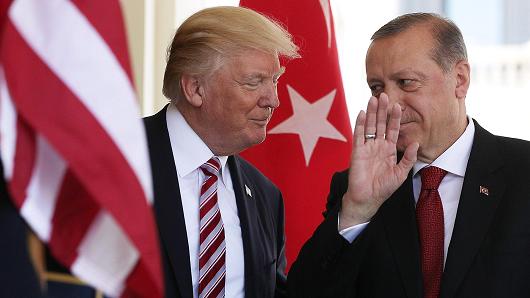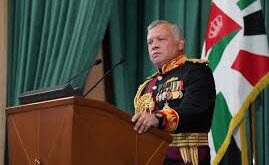Commentary | Editor
Experts say that US-Turkish relations are at their lowest since the 1974, when Congress imposed an arms embargo after Turkey invaded Cyprus, according to a recent CNBC article.
Since botched coup last July relations between the US and Turkey have been in a downward spiral. In May this year US announced intention to arm Syrian Kurds additionally angering Turkish leadership, which considers the Kurdish group an extension of Kurdish Workers Party (PKK) – a designated terrorist organization in Turkey.
Meanwhile, during Astana Peace talks on Syria in May, Turkey made a surprising move and joined Russia and Iran initiative to establish de-escalations zones across the war-torn country – in which the three guarantors are backing opposing parties.
Not necessarily a retaliation or a tit-for-tat move vis-a-vis American support for the Kurds, few months later, in September, Turkey has announced signing of a purchase agreement for Russian S-400 air-defense system – signalling a turn away from the NATO military alliance after more than six decades of relations.
All the while both Turkish, US and EU media and politicians have been trading accusations of broken promises. The row with the US culminated after Turkish arrest of US Embassy employee last month, under the pretext of his collaboration with the FETO terrorist organisation, which State Department spokeswoman Heather Nauert characterized as deeply disturbing. The US responded by imposing a temporary halt to all nonimmigrant visa applications from Turkey. Turkey retaliated in kind cancelling all visas to Turkey.
Tense US-Turkish relations could take new hit with upcoming trial on 27 November when New York court is expected to convict Iranian-Turkish national Reza Zarrab for breach of US sanctions against Iran through money laundering with high-ranking Turkish officials with close ties to Turkish president Erdogan and Ankara’s political elite. Former minister of economy under Erdogan, Zafer Caglayan, is also indicted in the case. It is believed that the trial and its outcome are going to be rather embarrassing to the Turkish ruling brass.
Both Turkish and foreign observers of Turkish-American affairs seem to concur that the relationship is losing its former significance as a ‘strategic partnership’ and is increasingly seen as going towards breakup under Erdogan’s rule. In an article for Financial Times Former Assistant Secretary of State for European and Eurasian Affairs Philip Gordon viewed the relations pessimistically as “probably beyond repair”.
Further indicator that either side is unwilling to compromise on key contentious issues was evident during Turkish PM Binali Yildirim’s visit to Washington last week. During his meeting with the US Vice President Mike Pence Yildirim reiterated FETO leader’s extradition request, whom Turkey holds responsible for the last year’s coup. Furthermore, Yildirim also urged the US to halt arms support for the Kurdish PYD. Both Turkish requests are also seen from the US as blackmail rather than diplomacy. Neither of the two sides seem willing to change their attitudes, hence relations are bound to stay tense and likely worsen further, despite Monday resumption of visa processing.
Worsening or breaking relations would primarily negatively affect military ties between two NATO allies and the future of Turkey’s Incirlik air base, from which Germany has recently pulled its troops after a spat over access denial to the German parliamentarians.
A number of commentators and think tank pundits have already started speculating on NATO breakup amid Turkish unreliability as a partner, calling Turkey the first NATO dropout.
While his PM was in Washington trying to mend ties Turkish President – commenting on recent Trump-Putin joint statement issued on the margins of APEC Summit in Vietnam – told journalists, ahead of his trip to Russia, that those who do not believe in a military solution in Syria should pull their troops out. Erdogan continued criticizing both the US and Russia for having military bases in Syria, and added that he will discuss the matter with Russian President during their meeting.
Before leaving for Russia, Erdogan further said “We agreed with Russia on S-400 [supplies], the documents are signed. There are some technical details; we will discuss them within the framework of my visit. …We want to take steps to implement this deal as soon as possible”.
Why the sudden rush for the S-400 deal implementation?
Since September signing of the agreement events in Turkey’s neighborhood have been developing at a rapid pace. The escalation of tensions between both Saudi and Qatar, to a degree, and even more so the American President’s threats of pulling out of Iran nuclear deal agreement (JCPOA), and most recent Saudi near declaration of war on Lebanon to fight Hezbollah, in an attempt to curb Iranian influence in the region, may have prompted Erdogan to press on the issue.
Furthermore, during his historic October visit to Moscow, Saudi king Salman has also signed an agreement on the purchase of the same air-defense system, and was closely followed by Qatar, which Turkey along with Iran has decided to back in the GCC rift. The winding down of a Syrian war and the Qatar crisis seem to have given an additional impetus to arms race in the region.
Surprisingly, Turkish president’s remarks on need for speedy implementation of the air defense systems purchase deal with Russia was met with a conciliatory remark by the US Defense Secretary James Mattis as a “sovereign” decision of government in Ankara, “That’s a sovereign decision for Turkey. Clearly, it will not be interoperable with NATO. So they’re going to have to consider that if they go forward.” as quoted by Anadolu Agency.
Unlike harsh criticism that the Turkish deal with Russia has received from the European NATO officials, the US Defense Secretary’s comment seems to signal that America is ready to let Turkey go – if it wishes so.
The notion of ‘sovereignty’ was one of the key points in Trump’s speech at the last UNGA session, one that was lost to many analysts and media, but for others it offered a glimmer of hope that Trump might be signalling willingness to return to the pillars on which the international order as we know it was built on the backdrop of the WWII destruction.
Does it mean that the US is ready to allow Turkey to chose its own military alliance in the near future should it chose so? Would the eventual Turkish ditching of NATO for another alliance also lead to the breakup of the alliance or to (Erdogan’s) Turkey becoming another Middle Eastern regime to deal with through intervention?
 Geostrategic Media Political Commentary, Analysis, Security, Defense
Geostrategic Media Political Commentary, Analysis, Security, Defense





